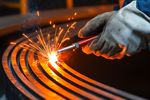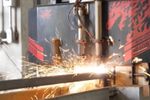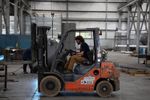In spite of recent anxiety over tariff wars, fluctuating steel and aluminum prices, and news reports of layoffs at GM, steady industry growth has been the biggest trend for metal fabricators and manufacturers in 2018. In fact, thousands of manufacturing job opportunities are pouring into the U.S., thanks to production reshoring from Asia. The Gross Domestic Product (GDP) continues to rise, with the global metal fabrication market expected to reach $24 billion by 2024.
Metal fabrication productivity levels and efficiency metrics are on the rise, thanks in part to CNC machine advances such as 3D printing, tube laser technology, and newly available collaborative robots powered by artificial intelligence. These new automation tools are reducing metal shop costs as many machines no longer require human supervision for extended periods. Innovations like hot-dip galvanization help fabricators create products that require little to no maintenance, saving time and money.
These exciting industry trends are encouraging news for fabricators, but it’s important not to lose sight of the metal fabrication fundamentals that create quality outcomes.
Getting the job right the first time means avoiding costly reworking and scheduling delays, so here are some best practices that lead to those quality outcomes.
Engineering Metal Designs That Fit
Every custom metal fabrication project begins with a design, but it takes engineering expertise to ensure concepts develop into components that fit. One small flaw in a steel or aluminum part can result in a failed inspection that means the whole project must start all over again. Only a trained eye can spot potential design flaws that can derail production before it even begins.
For example, most steel products must go from “design” to “fabrication design” to address potential issues that could bottleneck production. Such custom projects require expertise to ensure none of these critical steps are missed:
- First concept design
- Fabrication design
- Product design
- Engineering
- Prototyping
- Fabrication
From precise welds to perfect O-Rings to a polished finish, only a true full-service custom metal fabricator will have experienced engineers on staff to dot every “i” and cross every “t” for project success.
It Takes a Village: Solving Problems Before They Start
When cutting, forming, assembling, finishing, and installation teams work together under one roof, potential project weaknesses can be identified before they occur. Here are a few logistical challenges that can be tackled head-on with a full-service custom metal fabrication team:
- Pollution Control: From heavy ductwork and dust collectors to cyclone equipment, custom pollution control requires the right materials, welding standards, and finishing requirements to meet even the toughest code-inspector standards.
- Bulk Storage Solutions: Custom fabricated accessories like skirted bottoms, integrated piping, and discharge chutes are key to creating hoppers, metering bins, tanks, and silos that can properly store and dispense dry feed, cement, water, oil, and other chemicals.
- OSHA-Compliant Access: Just one industrial ladder can result in multiple OSHA fines if every metal component isn’t custom fabricated to pass muster: side rails, rungs, platforms, landings, safety cages, and more.
- Cost-Efficient Material Handling: The ability to move specialized materials from point A to point B without damage or waste can make or break the bottom line. A full-service fabrication team can oversee every exact measurement and specification required for each custom material handling project.
Quality Control and QA Essentials
Any reputable full-service custom metal fabricator will have a Quality Assurance chain of command to document every stage of the fabrication and installation process, from initial drawings to welding procedures to handling, storage, and shipping.
The fabrication team’s Quality Control Manager should be able to provide detailed documentation and photos at any point during a custom project upon request. Additional team members responsible for QA should include the:
- Purchasing Department
- Shop Manager
- Engineering Manager
- President and/or CEO
From A to Z, the entire chain of command must work together to ensure each finished product meets all required specifications and quality standards.
Your Fabrication Fundamentals Partner
For more than 27 years, Southern Metal Fabricators has practiced essential fabrication fundamentals to grow every customer’s vision into reality, from design to delivery.
If you’re ready to partner with a true full-service fabricator to meet or exceed your requirements, give us a chance to say, “Yes, we can do that!” by contacting us today.





